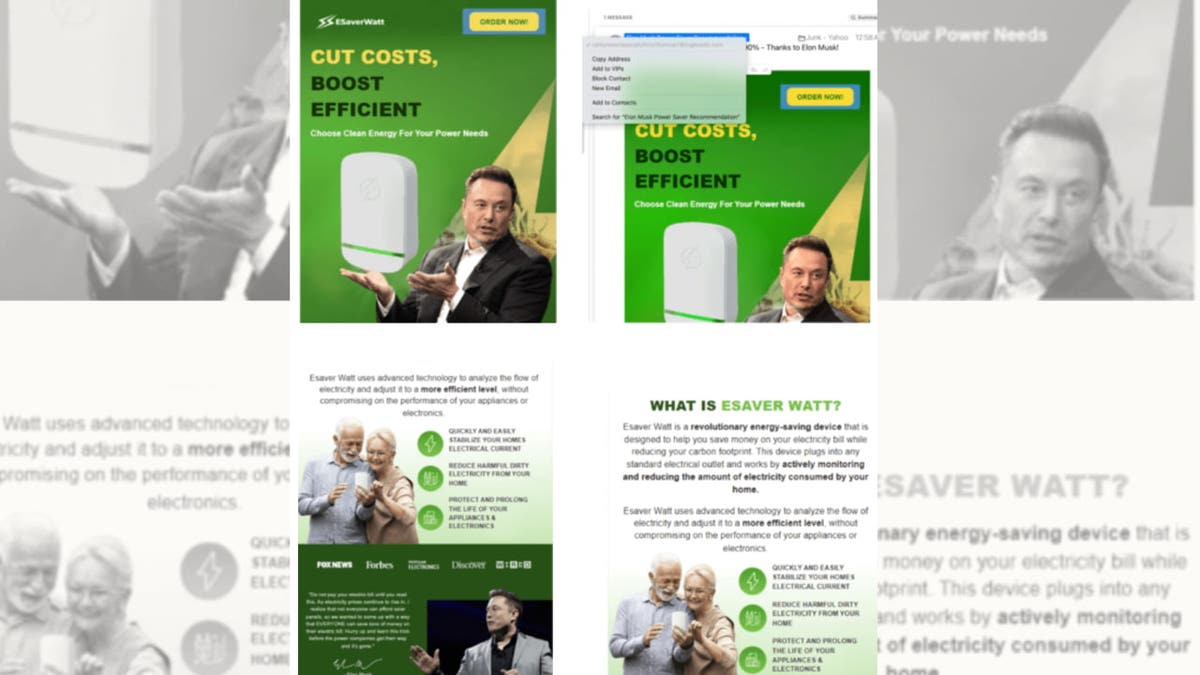Tech entrepreneur Elon Musk, renowned for his leadership at Tesla, SpaceX, Neuralink, and xAI, and for acquiring and rebranding Twitter to X, is frequently associated with innovation. However, his prominent status also makes him a target for scams. Previously, fraudsters exploited Musk's name in cryptocurrency schemes. Now, a new deceptive tactic involves promoting fraudulent "energy-saving" devices falsely linked to Musk to gain consumer trust.
These devices, advertised as groundbreaking solutions, are falsely marketed with Musk's endorsement to deceive buyers. One consumer reported receiving unsolicited emails promoting an energy-saving device supposedly developed by Musk, promising a 50% reduction in energy bills. This is a clear example of the scam in action.

Illustration of a scammer at work (Kurt "CyberGuy" Knutsson)
How the Scam Operates
The scam unfolds through attention-grabbing online advertisements, unsolicited emails, and other misleading strategies. Scammers advertise these purportedly "revolutionary" devices across social media, pop-up ads, emails, and even search engine ads, falsely claiming Musk's association. These ads frequently incorporate fabricated customer testimonials, inflated promises of drastically reducing electricity costs, and limited-time offers to pressure potential victims.
Device names used in these scams include Power Pro Save, Heunwa Power Save, Stop Watt, Miracle Watt, True Watt, Real Watt, Watt Rescue, Esaver Watt, Pro Power Save, Voltmod, and others. Clicking these ads directs users to seemingly legitimate websites filled with fake logos, altered images, and fabricated celebrity endorsements to establish a sense of credibility.
These websites use technical jargon like "stabilizing electrical currents" or "rebalancing loads" to sound convincing. They also employ tactics like displaying inflated "regular" prices crossed out to make the current offer appear exceptionally attractive. However, closer inspection reveals a lack of essential information such as a company address, contact number, or business registration details. Instead, they pressure immediate purchase through an online form, requiring upfront payment via credit card or PayPal.
Victims often receive a cheap, ineffective device or nothing at all. These devices don't lower electricity consumption and may even increase it. By the time the deception is realized, the scammers have vanished with the money.

Elon Musk scam email ads (Kurt "CyberGuy" Knutsson)
The Reality of Energy-Saving Devices
Numerous power-saving scams have falsely promised to drastically reduce or eliminate electricity bills. In truth, no device can simply be plugged in to achieve such results. These products often claim to "stabilize voltage" or "reduce power waste." While voltage stabilization can be beneficial in industrial settings, it's largely irrelevant for household appliances, which are designed for efficient operation.
Genuine energy savings are achieved through practical measures like upgrading to energy-efficient appliances, utilizing smart home technology, and managing energy consumption patterns.

A person checking email on a phone (Kurt "CyberGuy" Knutsson)
Identifying Red Flags
- Exaggerated promises of significant energy bill reductions.
- Unsolicited emails promoting the product.
- Exploitation of celebrity names like Elon Musk.
- Suspicious links in emails.
Protecting Yourself
- Verify email senders and be wary of poor grammar or urgent calls to action.
- Research products from reliable sources before purchasing.
- Avoid clicking links in unsolicited emails; hover over them to check the destination.
- Use strong antivirus software and keep it updated.
- Scrutinize websites for missing contact information or fake testimonials.
- Be skeptical of deals that seem too good to be true.
- Avoid unusual payment methods; stick to secure options with buyer protection.
- Mark spam emails as junk or spam.
- Protect your email address and consider using disposable emails or aliases.
- Use a personal data removal service to minimize your online footprint.
Key Takeaway
Impersonation scams are prevalent, often using famous names or brands to gain trust. Avoid unsolicited offers and stick to reputable sellers. Always verify offers before purchasing, especially from unfamiliar sources.
Comments(0)
Top Comments